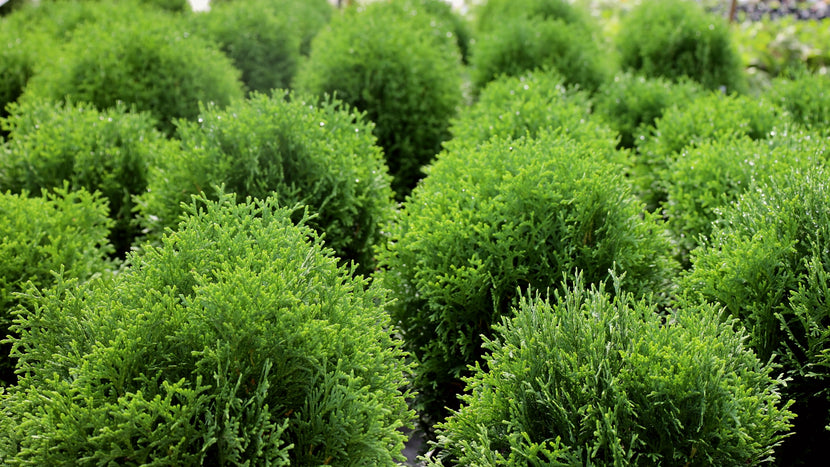How To Plant Arborvitae Shrubs
Plant Guide

Arborvitae shrubs are one of the most popular shrub selections across the country! You may choose to plant arborvitae for its vibrant evergreen color, hardy and full foliage, or the low-maintenance care regimen!
There are so many arborvitae shrubs to choose from when planning out your landscape! From smaller spherical and compact forms like the Hetz Midget Arborvitae, to the more eccentric and wild Thuja Whipcord plants, the versatility of these shrubs is endless!
When it comes to the planting and care of these popular yard plants, there are a few main factors you want to keep in mind in regards to your plant's lighting, soil, water, and fertilizer needs. Keep reading to learn all there is to know about planting and caring for arborvitae shrubs!
Ground Rules
Light
Arborvitae Shrubs grow best in conditions of partial to full sun.
Water
Arborvitaes grow best in consistently moist soil; however, too much water can lead to root rot and the death of your plants. We recommend using a soil soaker hose or drip irrigation system on your arborvitaes to ensure they are getting the moisture they need without over doing it.
Soil
Arborvitaes enjoy a rich well-draining soil medium.
Food
Arborvitaes don't require fertilizer for survival; however, they would benefit from the application of a well-balanced, slow-release fertilizer blend in the growing seasons of spring and summer to help promote new growth.
Temperature
Arborvitae shrubs fare better in dry, cool climates. Once established though, these hardy shrubs are moderately drought-resistant and can tolerate intense cold climates as well.
Toxicity
Arborvitae is considered mildly toxic to animals and humans.
Mulch
As with most shrubs, your arborvitaes could certainly benefit from a light mulching around the base of the plant. Mulch helps to conserve moisture while protecting the overall root system of your plants.
Planting Process
- Dig a hole two to three times the size of the root ball.
- Remove the arborvitae shrub from its grower pot and loosen the root ball.
- Place the arborvitae in the hole and backfill with remaining soil.
- Mulch around the base of the shrub and water thoroughly.
Arborvitae Shrubs and Their Foliage Types
| Arborvitae Type | Foliage Description |
|---|---|
| Anna's Magic Ball Arborvitae | Globe-shaped, vibrant chartreuse foliage |
| Fire Chief Thuja | Unique vibrant green foliage with fiery orange tips. |
| Globe Arborvitae | Large, naturally spherical shrubs, bright kelly green in color |
| Golden Globe Arborvitae | Dome-shaped, lemon-lime coloring |
| Hetz Midget Arborvitae | Petite sphere form, deep forest green foliage |
| Little Giant Arborvitae | Compact globe shape, deep hunter green foliage |
| Mr. Bowling Ball Arborvitae | Low growing, wide ovate form with lacy, pine green foliage |
| Rheingold Arborvitae | Densely branched, golden yellow foliage |
| Thuja Whipcord Arborvitae | Unique strands of gracefully arching deep green branches |
| Tom Thumb Arborvitae | Compact round growth habit, bright green foliage |
